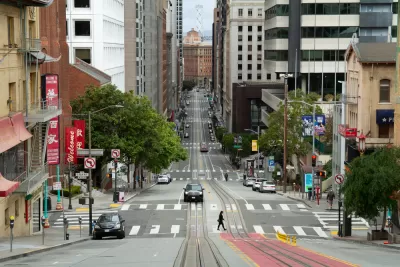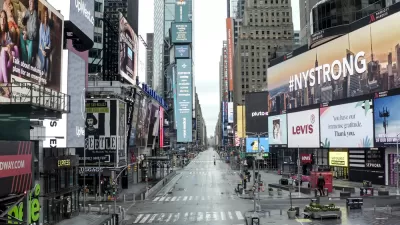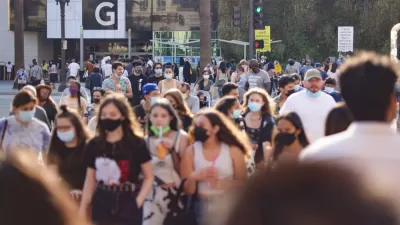An argument for the long-term cultural and economic viability of the city, even after the pandemic.

Highly productive workers and industries will continue to cluster in cities, and remote work can only go so far in reshaping the global economy, according to one leading economics researcher.
Jerusalem Demsas writes in the article and interview linked below on one of the most common questions of the pandemic: Will workers return to the city, or will huge number of former office workers and urban dwellers decamp for good to the suburbs, where they'll work from home for the rest of their careers?
"Much ink has been spilled on how Covid-19 will impact the urban geography of the United States," writes Demsas to introduce the context of the argument to come. "Early in the pandemic, some were even forecasting the death of the nation’s superstar cities as some urban dwellers fled for the suburbs."
There were plenty of signs for naysayers of urbanity to point to in predicting the death of cities as a result of the pandemic. "As the year went on, demand for suburban homes fueled questions about whether these moves would be permanent," and "A June National Bureau of Economic Research paper by researchers from the University of Chicago estimated that 37 percent of jobs can be performed entirely remotely."
There are still, however, reasons to believe in the ongoing centrality of large cities in the economy and culture of the United States. To present that case, Demsas interviews with Enricco Moretti, economic professor at the University of California, Berkeley, who authored the 2013 book The New Geography of Jobs.
"In this interview, Moretti explains why high-productivity workers cluster in a handful of cities and why the strength of those forces means it’s unlikely that very many of us will be working fully remotely in the long run. We also discuss why such a small slice of the American labor force can determine so much about which cities dominate," writes Demsas.
FULL STORY: Remote work is overrated. America’s supercities are coming back.

Alabama: Trump Terminates Settlements for Black Communities Harmed By Raw Sewage
Trump deemed the landmark civil rights agreement “illegal DEI and environmental justice policy.”

Planetizen Federal Action Tracker
A weekly monitor of how Trump’s orders and actions are impacting planners and planning in America.

The 120 Year Old Tiny Home Villages That Sheltered San Francisco’s Earthquake Refugees
More than a century ago, San Francisco mobilized to house thousands of residents displaced by the 1906 earthquake. Could their strategy offer a model for the present?

In Both Crashes and Crime, Public Transportation is Far Safer than Driving
Contrary to popular assumptions, public transportation has far lower crash and crime rates than automobile travel. For safer communities, improve and encourage transit travel.

Report: Zoning Reforms Should Complement Nashville’s Ambitious Transit Plan
Without reform, restrictive zoning codes will limit the impact of the city’s planned transit expansion and could exclude some of the residents who depend on transit the most.

Judge Orders Release of Frozen IRA, IIJA Funding
The decision is a victory for environmental groups who charged that freezing funds for critical infrastructure and disaster response programs caused “real and irreparable harm” to communities.
Urban Design for Planners 1: Software Tools
This six-course series explores essential urban design concepts using open source software and equips planners with the tools they need to participate fully in the urban design process.
Planning for Universal Design
Learn the tools for implementing Universal Design in planning regulations.
Jessamine County Fiscal Court
Caltrans
Institute for Housing and Urban Development Studies (IHS)
City of Grandview
Harvard GSD Executive Education
Toledo-Lucas County Plan Commissions
Salt Lake City
NYU Wagner Graduate School of Public Service




























